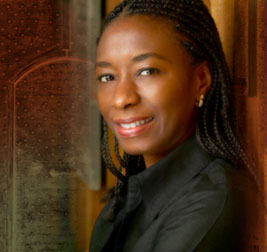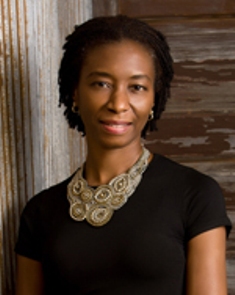Sefi Atta was born in Lagos, Nigeria. She was educated there, in England and the United States.
She is the inaugural winner of the Wole Soyinka Prize for Literature in Africa. She won the prize in 2006 with her debut novel Everything Good Will Come. She is also the winner of PEN International’s 2004/2005 David TK Wong Prize.
A former chartered accountant and CPA, she is a graduate of the creative writing program at Antioch University, Los Angeles. Her short stories have appeared in journals like Los Angeles Review and Mississippi Review and have won prizes from Zoetrope and Red Hen Press. Her radio plays have also been broadcast by the BBC.
Her short story collection, Lawless, received the 2009 Noma Award For Publishing in Africa. Lawless is published in the US and UK as News From Home.
She lives in Mississippi with her husband Gboyega Ransome-Kuti, a medical doctor, and their daughter, Temi.
Her next novel, A Bit of Difference was recently launched at the Melbourne Writers Festival, and will be out in the United States in September 2012.
What is the most memorable part of your growing up years and in what way did that contribute to your emergence as a writer?
The four years I spent at Queen’s College, from 1974-78. We were not allowed to watch television, but were encouraged to read and express our creativity. Every Saturday night a class entertained the school in our assembly hall. We had fashion shows, traditional dances and plays. I was the head of the drama society in my final year at Queen’s College. It was a safe place to develop my creativity.
How do you spend time when you are not writing?
I spend time with my family.
You were opportune to know the late Fela Anikulapo-Kuti not only as an artiste and activist but also as an uncle-in-law so to speak; how much of his qualities and ideals, would you say inspire your own personality as a creative artist?
Fela was my husband’s uncle and I met him a few times, but I didn’t know him. Fela met a lot of people. I admire him greatly for his courage and integrity.
Are you working on any book at the moment and if yes can you tell us what it’s about?
I’m revising a book about an American woman in Nigeria and another about a Nigerian man in America.
Why did you switch from accounting to literature? From which do you derive the utmost satisfaction?
Writing. I started writing in the United States in 1995. I wrote part-time when I worked as an accountant in New York. In 1997, I moved to a small city in Mississippi with my family. My husband got a job here, as foreign-trained doctors do. I was out of work, so I started to write full-time.
Rape is a sub-theme in your best known work, Everything Good Will Come. The perceived trend however, is that beyond writing, women writers – especially those from Africa – have done little or nothing by way of actively campaigning for issues bordering on women rights. What do you feel is responsible for this trend?
I’m not sure who perceives this trend, or if it can even be called a trend. I can only speak for myself and I’m a writer not an activist. There are grassroots organizations dedicated to women’s issues in general and I get involved whenever I’m invited.
As someone who has won a number of notable literary awards, how much do you think literary awards contribute towards advancing the career of writers in general and what has been your own particular experience in this regard?
I submitted my works to contests to promote them and build my bio. Literary awards are more important than they should be in advancing writers’ careers. I don’t write to win prizes and I’m not preoccupied with them. I didn’t even enter the NLNG prize this year.
There is the perception that the reach and acclaim that African writers, published in the US and the West achieve, is largely due to their location and the support and opportunities available therein; do you share this perception?
Yes, I do, but at the same time being overseas and having support here can dislocate Nigerian writers from Nigerian readers, and I have to be mindful of that.
Do you hear from your readers much? What kinds of things do they say?
All the time. They are very supportive and I appreciate them a lot.
From 2006 till now, you have published four books. Do you ever suffer from writers’ block and if yes how do you deal with it? What advice would you give to writers who are affected by writers’ block?
Write what you want to write. I only suffer from writers’ block when I write non-fiction. I write horrible non-fiction, especially when I’m writing about myself.


Good day! This post could not be written any better!
Reading through this post reminds me of my good old room mate!
He always kept talking about this. I will forward this post to him.
Fairly certain he will have a good read. Many thanks for sharing!